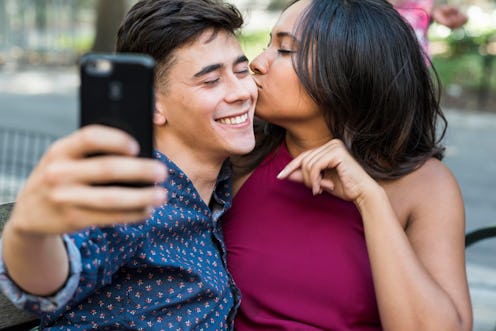
A widely accepted rule in human psychology is that people have a tendency to view themselves in the best possible light: it's called illusory superiority and, in healthy people, it can help boost self-efficacy, or the belief that we can successfully accomplish a task or perform well in a certain situation. But social media FOMO is disrupting that process and supporting an irrational belief that every one else's social life is superior to our own. A new study led by Cornell University researcher Sebastian Deri found that, in comparison to every other way in which we generally believe we're better than others, people have "a surprisingly grim outlook on their social lives."
The study, depressingly titled "Home alone: Why people believe others' social lives are richer than their own," was published this month in the Journal of Personality and Social Psychology and its findings hold steady across multiple populations. They surveyed college students, MTurk respondents, shoppers at a local mall, and participants from a large, income-stratified online panel, and each group showed a bias believing that other people's social lives were more active and exciting than their own. Most distressingly, this bias correlates strongly to our wellbeing, which means it could carry with it significant health consequences.
Researchers argued that one of the reasons people perceive their own social lives in such a negative light is because they aren't comparing them using a representative sample of other people's social lives. Instead, we compare our social lives against the examples that come to mind the fastest, which are often the most memorable because they are the most impressive or novel. In other words, someone's perfectly composed Snapchat Story sticks in your mind and then later, when you're assessing how you feel about your own social life, you tend to recall only the most extreme examples of other people's social bliss.
Part of the problem with this is that people's social media accounts are specifically curated to be a highlight reel of what's going on in their lives; they aren't meant to be a representative sample of someone's full range of experiences and emotions, many of which are totally mundane and boring!
The other side of this coin is that, even when we ourselves are out being social and composing our own envy-inducing Snapchat Stories, a group setting tends to trigger these same pessimistic biases. Being in a group forces us to consider other people's inner lives more deeply and thoughtfully than we might if we were alone. In that process of imagining what other people's inner lives are like, we often tell ourselves a story that they must be great, far better than our own.
One way researchers say this can be combatted is by "reducing the availability of extremely social people." Yes, that might mean unfollowing some of your most glamorous Instagram faves. If the incessant posts of your college arch nemesis regularly send you into an emotional tailspin, wondering if you'll ever have what she gets to have, it's probably a good idea to remove her from your daily content intake — not just because you'll think about her less often, but because you'll start to think more kindly of your own social life.
Not to mention, it's simply impossible for everyone to be correct in their belief that everyone else's social life is superior to theirs. (Although I would personally love to know who Beyoncé thinks is outperforming her in the quality of social life department: Celebrities! They suffer inferiority complexes just like us!) If nothing else, take comfort in the ever-present truth that your problems aren't special and literally everyone else feels exactly as insecure as you do.